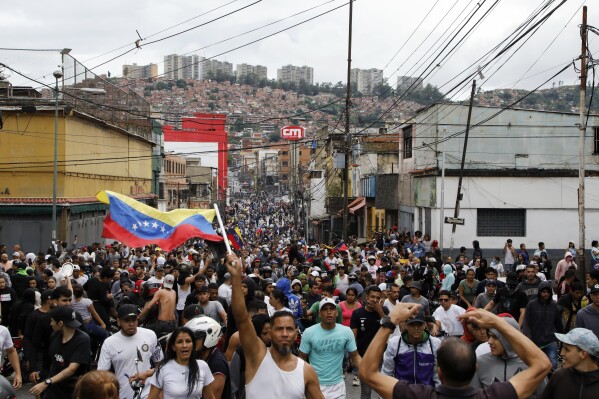Meta oversight panel says political content cuts could limit dissent in crises including Venezuela’s

MEXICO CITY (AP) — Meta’s efforts to scale back political content on its platforms could limit the reach of people’s expressions of dissent or awareness during crises, including Venezuela’s post-election situation, the company’s oversight panel said Thursday in a decision on cases involving videos taken after the July vote in the South American country.
The quasi-independent Oversight Board urged the social media giant to apply an existing protocol for crisis situations “to ensure that political content during crises can have the same reach as other types of content.”
The decision came as Meta clamps down on the amount of news and political content users see following years of criticism about how it handles misinformation and whether it contributes to political polarization.
Meta set up the board in 2020 to be a referee for content on its platforms, including Facebook and Instagram. The company referred to the board two videos related to pro-government armed groups, known in Venezuela as “colectivos,” that were posted after the July 28 presidential election, whose official result prompted protests across the country.
One of the videos, posted to Instagram, shows a group of armed men on motorcycles pulling up to an apartment complex. A woman can be heard shouting in Spanish that the “colectivos” were trying to access a building, while the person taking the video can be heard yelling in the same language “Go to hell! I hope they kill you all!”
Meta determined the video did not violate its policies because “the expression was a conditional or aspirational statement against a violent actor rather than a call to action,” according to the decision. The board agreed with the company.
The other video reviewed by the Oversight Board was posted on Facebook. It shows people running and a group of men, presumed to be “colectivos” riding motorcycles. The man who filmed the video can be heard saying the group is attacking the people on the street. The caption in Spanish accompanying the post criticizes the government’s security forces for not defending people from the violent, ruling-party loyal gangs and calls on the state’s forces to “kill those damn colectivos.”
Meta took down the video for representing “a call to action to commit high-severity violence,” according to the decision. The board disagreed, finding that it is similar to the Instagram post and, in Venezuela’s current context, “understood as an aspirational statement.”
“The Board acknowledges Meta’s concern that allowing this type of expression could contribute to a heightened risk of offline violence in an ongoing crisis,” according to the decision. “However, given the specific context of Venezuela, in which widespread repression and violence is carried out by state forces jointly with colectivos, and where there are strong restrictions on people’s rights to freedom of expression and peaceful assembly, it is fundamental to allow people to freely express their dissent, anger or desperation, even resorting to strong language.”
Thousands of people, including minors, took to the streets across Venezuela hours after ruling party-loyal electoral authorities declared President Nicolás Maduro the winner of the July 28 election. The protests were largely peaceful, but demonstrators also toppled statues of Maduro’s predecessor, the late leader Hugo Chávez, threw rocks at law enforcement officers and buildings, and burned police motorcycles and government propaganda.
Maduro and his ruling party allies, who control all aspects of government, responded to the demonstrations with full force. A Wednesday report from Human Rights Watch implicated Venezuelan security forces and “colectivos” in some of the 24 deaths that occurred during the protests.
While the National Electoral Council declared Maduro’s victory, it never released vote tallies backing their claim. However, the main opposition coalition claimed that its candidate, former diplomat Edmundo González, defeated Maduro by a 2-to-1 margin and offered as proof vote tallies from more than 80% of the electronic voting machines used in the election.
Meta, then called Facebook, launched the Oversight Board four years ago in response to criticism that it was not moving fast enough to remove misinformation, hate speech and influence campaigns from its platforms. The board has 21 members, a multinational group that includes legal scholars, human rights experts and journalists.
- The year will test even the most robust democracies. Read more on what’s to come here.
- Take a look at the 25 places where a change in leadership could resonate around the world.
- Keep track of the latest AP elections coverage from around the world here.
